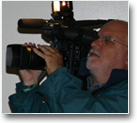 Trent University Researcher a Lead Contributor to UN Global Environmental Outlook ReportFOR IMMEDIATE RELEASE Students benefiting from Prof. Raul Ponce-Hernandez’s experiences as chapter writer for groundbreaking publication Friday, December 1, 2006, Peterborough Trent University is gaining visibility in environmental circles within the United Nations and in the wider international community thanks in large part to the significant contributions Trent researcher Raul Ponce-Hernandez is making to a groundbreaking Global Environmental Outlook (GEO) report coordinated by the United Nations Environment Program (UNEP), which examines the role and impact of the state of the environment on human well-being as well as the use of environmental assessment and valuation as a decision-making tool. Prof. Ponce-Hernandez, who teaches in the Environmental and Resources Studies and Geography departments at Trent, was approached by the UNEP to take part in the project in 2004 as a lead author of one of ten chapters in the report. Since that time, he has been working with a team of approximately 20 scientists from around the world to produce a comprehensive chapter providing an overall global assessment of status and trends of lands. Within the chapter, Prof. Ponce-Hernandez has had special responsibility for sections on global land degradation and reporting on the state and trends on the biologically-mediated cycles of carbon and nutrients. “Much work analyzing and interpreting data from many varied sources has gone into this report. The simple act of coordinating and integrating approaches, viewpoints, interpretations of results and figures and perspectives has been a challenge in itself”, comments Prof. Ponce-Hernandez. “Overall the process has been very, very intense. It has been, at times, overwhelming but at the same time I feel very privileged to have the opportunity to contribute to such a significant report.” The first draft of the chapter was completed and approved at meetings of the GEO group held in Nairobi and Rome in 2005. The second and final draft was completed through an intense and substantial peer-review process including stakeholder input from the science, government, international agency, NGO’s and the private sector communities. The draft was finalized during a recent authors’ meeting in Cairo, Egypt where Prof. Ponce Hernandez was selected as one of six people to undertake the intense last revision process and to finalize the document prior to submission for translation and publication by the UNEP. The full report is scheduled for release in the fall of 2007. The chapter on lands is one piece of the GEO report, which is the fourth in a series compiled by the UNEP. This report, the GEO-4, examines present global, regional and local issues in the context of status and trends. It also looks at the development of international environmental governance, which is vital to getting policies translated into results on the ground, and reverse negative states and trends of environmental degradation affecting human well-being. The report aims to identify human drivers of pressures on resources and the impact of human activities and the consequences of global environmental change for ecosystem services. It assesses the challenges and opportunities of certain key cross-cutting issues for sustainable development goals and targets (i.e. climate change, biodiversity, desertification and others) and how environmental degradation can impede progress towards those targets. The GEO-4 report will present a global and sub-global outlook including short-term (up to 2015) and medium term (up to 2050) scenarios for the major environmental issues and possible policy responses from global, regional and local levels. “The report is a comprehensive assessment on the status of the planet,” Prof. Ponce-Hernandez explains. “It is part of the United Nations Environment Program’s core mandate to keep the global environment under review.” In addition to bringing visibility to Trent, Prof. Ponce-Hernandez’s involvement in the GEO-4 report also works to grant his students a unique opportunity to benefit from the knowledge gained by being part of such a groundbreaking project. “The things I have learned from my colleagues on this project and the cutting-edge approaches we have used have found their way into my lectures at Trent,” he says, explaining that in his Soil Management and Conservation and Watershed Management classes, for example, he is teaching the UN’s DPSIR (Drivers, Pressures, States, Impact, Responses) approach, an innovative way of understanding the causes and impacts of environmental degradation on the livelihoods of people and the planet. In addition, Prof. Ponce-Hernandez explains, “my students are able to work on pieces that have relevance and have a use outside of the course work through very carefully thought out and specific term projects – they are contributing to something that may be of relevance for the work being undertaking in leading-edge agencies like the UN. I see this work as a conduit for students to get exposure to issues of relevant significance.” Contributing to the GEO publication for the UNEP is the latest project in a relatively long research relationship between Prof. Ponce-Hernandez and UN agencies. In 1996 he led a team in crafting the methodology for the “Economic and Ecologic Zoning” of the Amazon Basin, following which he was engaged by the Food and Agriculture Organization (FAO) of the UN for researching methods and developing modelling tools for the assessment of carbon sequestration in agricultural and forested lands in the developing world. In addition, in 2002 and 2004, as a visiting research scientist at the FAO headquarters in Rome, Prof. Ponce-Hernandez provided the main thrust in developing the methodology for the assessment of land degradation in drylands for the Global LADA project of FAO and UNEP; and in 2005 he adapted such methodology for the Middle East and conducted a pilot project with funding form the UN Economic and Social Program for West Asia (ESCWA) on the assessment of land degradation and the advance of desertification in the Bekaa Valley in Lebanon. -30- For more information, please contact: |
































